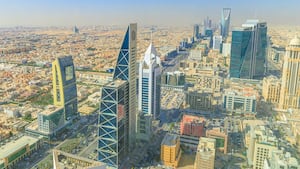When a Saudi consortium led by utilities giant Acwa Power signed $8.3 billion in deals this July to build seven solar and wind projects across the kingdom, it marked more than just another line entry in the country’s growing clean energy portfolio.
The projects will add 15 gigawatts of new renewable capacity, suggesting that Saudi Arabia is committing serious money and scale to green energy.
But does this mean the world’s largest oil exporter is genuinely changing how it invests in energy? That question matters because oil still dominates the kingdom’s economy, with Saudi Arabia shipping more than 15 per cent of total global crude exports last year. Those petrodollars fill state coffers and provide the dry powder for its $940 billion sovereign wealth fund, the Public Investment Fund.
That foundation is not going anywhere. But the kingdom is looking to hedge its bets, by maximising oil revenues today and investing in clean energy, technology and industry to prepare for a future in which global demand for oil is expected to peak around 2030 and begin a steady decline.
Acwa Power deal
The Acwa Power deal is part of that strategy. It aligns with Saudi Arabia’s “green initiative”, a programme launched by Crown Prince Mohammed bin Salman in 2021 to curb the kingdom’s reliance on oil money and diversify its economy.
The deal also supports its ambitious target of generating 50 per cent of its electricity from renewable sources by 2030 − which would be a meteoric rise from 1 per cent in 2023. It should also go a way to helping the kingdom reach its longer-term goal of net-zero carbon emissions by 2060.
However, some see Saudi Arabia’s continued investment in fossil fuels as a contradiction that undermines the credibility of these climate pledges. The country contends that it needs to balance the realities of energy security with long-term decarbonisation.
That balance comes at a price. Major green projects require huge investment, even though Saudi Arabia can produce renewable energy at a fairly low cost, thanks to abundant sunshine and low-cost solar panels. The highest hurdle is the upfront investment.
For its part, the Public Investment Fund plays a big role in making that possible, by offering long-term contracts and financial support to reduce risk and attract private capital. Without that state backing, such projects are unlikely to be commercially viable, and private sector participation would be far harder to secure.
State support was central to the Acwa Power deal. The PIF and Aramco Power, a subsidiary of oil giant Saudi Aramco, joined the consortium that signed long-term contracts with the state electricity buyer to develop the five solar farms and two wind projects across the kingdom.
But even as deals like this move forward, the need for large-scale investment is only growing. Electricity demand in Saudi Arabia has grown rapidly for decades, fuelled by economic expansion, population growth and rising living standards, though the pace has eased slightly in recent years.
Households still account for nearly 50 per cent of total electricity use, with air-conditioning alone responsible for most of that − a necessity in summer months when temperatures can reach a scorching 50°C.
What's driving the demand?
However, other factors are also driving that demand, including the energy needs of water desalination (removing salt from seawater to produce fresh water), as well as heavy industry and digital infrastructure, as the kingdom looks to diversify its economy.
But meeting that demand still relies heavily on fossil fuels. At present, the country burns about one million barrels of oil equivalent each day to meet electricity needs. And that carries not just a financial cost, but a climate burden.
Those two pressures are precisely why Saudi Arabia is investing in renewable energy. The thinking is that by switching to solar and wind power, the kingdom can free up more oil to export. This boosts petrodollar revenues and slashes the kingdom’s scope 2 emissions simultaneously. It is a win-win.
This is where green finance comes into focus, and not just in Saudi Arabia but in the broader Middle East region. One way that countries finance their energy transitions is through issuing green bonds. And here, Saudi Arabia has fallen behind its neighbour, the UAE. In 2024, the Emirates issued $7.4 billion in green bonds, the highest in the region, compared to $5.6 billion from Saudi Arabia, according to S&P Global Ratings.
Yet when it comes to scale, Saudi Arabia is aiming far higher. It plans to build 130 gigawatts of renewable energy by 2030, nearly 10 times the UAE’s 14-gigawatt target.
Some may view this as a reputational play; an attempt to present Saudi Arabia as more than just an oil state. But that overlooks the economic logic behind it. This is not about walking away from fossil fuels. It is about risk management.
By investing in clean energy, the kingdom is hedging against a future where oil may lose value. It is not a leap of faith. It is a calculated move to use current oil revenues to maintain relevance in a changing global energy system.
That logic is reflected in the Acwa Power deal. It is not a green revolution, but it marks a shift in posture. Saudi Arabia is no longer experimenting at the edges of clean energy; it is now building at industrial scale.
Oil will remain central to the Saudi economy for years, but Riyadh is ensuring that when the world moves on, it will have more than crude to offer.
Karl Schmedders is professor of finance at IMD


